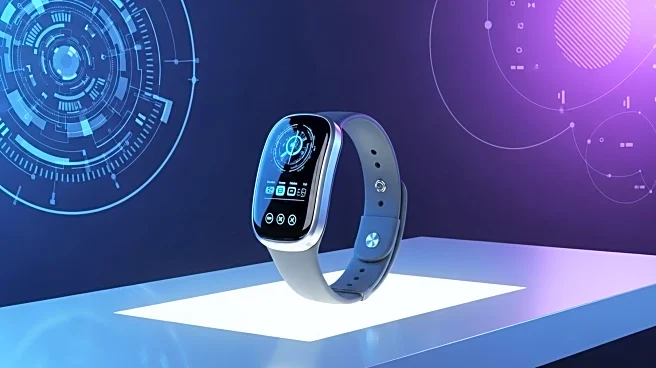What is the story about?
What's Happening?
Meta is set to unveil a neural wristband at its Meta Connect conference on September 17, which is expected to significantly enhance the control of its smart glasses. This wristband, developed through Meta's research in electromyography (EMG), allows users to control devices through muscle impulses detected by wearable sensors. The technology was acquired from CNTRL-Labs in 2019 and has been demonstrated by Meta CEO Mark Zuckerberg. The wristband is anticipated to be an accessory for Meta's new smart glasses, codenamed Hypernova, which will feature embedded displays. This development marks a major shift in Meta's wearables strategy, moving away from traditional camera-based hand tracking to more intuitive gesture-based controls.
Why It's Important?
The introduction of the EMG wristband represents a significant advancement in wearable technology, potentially setting a new standard for interface control in augmented reality (AR) and virtual reality (VR) devices. This innovation could enhance user experience by providing more precise and responsive control options, which are crucial for the adoption of AR and VR technologies. The wristband's ability to function independently of the glasses' line of sight could also broaden its application across various devices, potentially impacting the broader tech industry by influencing future designs of smart wearables. As Meta competes with other tech giants like Apple and Google, this development could position Meta as a leader in the next generation of wearable technology.
What's Next?
Following the Meta Connect conference, the market will be watching closely to see how the EMG wristband is received by consumers and tech enthusiasts. Meta's ability to integrate this technology with its existing and future products will be critical. The company may also explore expanding the wristband's functionality to include fitness tracking and health monitoring, potentially entering the smartwatch market. Additionally, Meta's competitors are likely to respond with their own innovations, as companies like Apple and Google are already exploring gesture-based controls. The success of Meta's wristband could accelerate the development of similar technologies across the industry.
Beyond the Headlines
The introduction of neural input technology raises questions about privacy and data security, as these devices will collect sensitive biometric data. Meta will need to address these concerns to gain consumer trust. Furthermore, the widespread adoption of such technology could lead to shifts in how people interact with digital devices, potentially reducing reliance on traditional input methods like touchscreens and keyboards. This could have long-term implications for user interface design and accessibility, making technology more inclusive for individuals with physical disabilities.

















